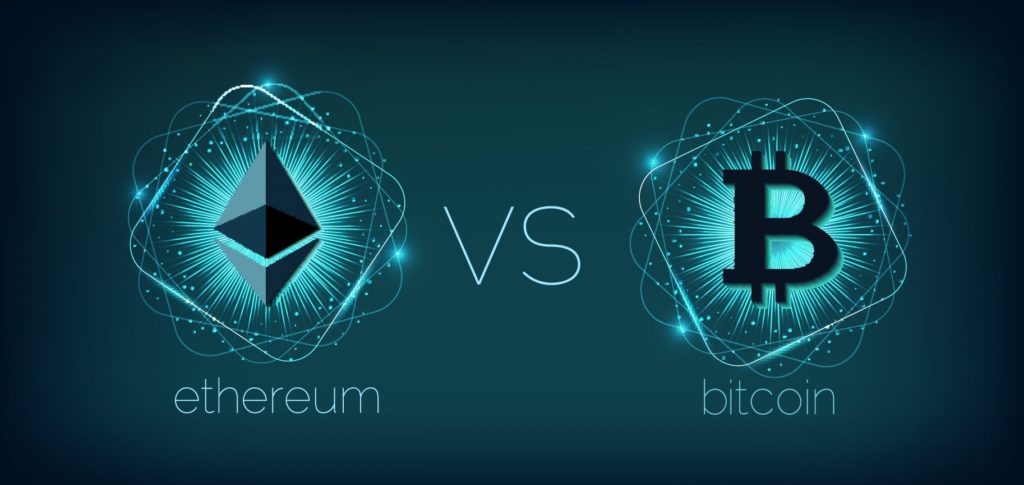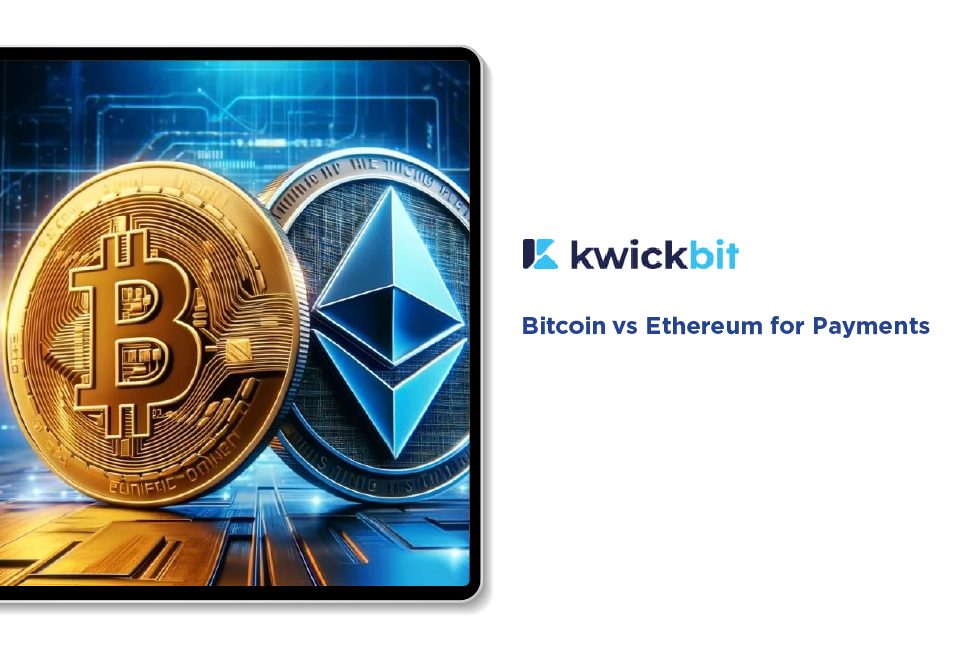Bitcoin (BTC) and Ethereum (ETH) are the two giants of the crypto world, but when it comes to real-world payments, they serve very different roles. Bitcoin is digital gold, often seen as a store of value, while Ethereum is the backbone of Web3, powering everything from smart contracts to DeFi applications.
So, if you’re looking to pay with crypto, which one should you go for? Let’s break it down. Uncover insights with KwickBit!
Bitcoin vs Ethereum: What’s the Difference?
Before deciding which crypto is better for payments, here’s a quick breakdown of how they stack up.
| Feature | Bitcoin (BTC) | Ethereum (ETH) |
|---|---|---|
| Main Use | Payments, store of value | Smart contracts, DeFi, payments |
| Transaction Speed | ~10 minutes | ~12-15 seconds |
| Fees | User-set fees | Gas fees (fluctuate based on demand) |
| Adoption | More widely accepted | Mainly used in Web3 & DeFi |
| Supply | 21 million (fixed) | Unlimited (but regulated issuance) |
| Blockchain Model | Proof-of-Work (PoW) | Proof-of-Stake (PoS) |
TL;DR: Bitcoin is the better choice for global payments, while Ethereum is faster but mainly used in DeFi and smart contracts.
Bitcoin for Payments: Pros & Cons
Bitcoin was literally created for payments, but is it the best option today?
Why You Should Pay with Bitcoin
- Widely Accepted – Thousands of businesses, from Microsoft to Newegg, accept BTC.
- Stable & Secure – Bitcoin is the most decentralized and secure blockchain.
- Fixed Supply – Only 21 million BTC will ever exist, making it scarce and valuable.
Why Bitcoin Might Not Be Ideal for Payments
- Slow Transactions – BTC takes ~10 minutes per block, not great for instant purchases.
- High Fees in Peak Times – Bitcoin fees can spike over $20 when the network is busy.
- No Smart Contracts – It’s strictly a currency, not a platform for programmable payments.
Best for: Large transactions, international payments, and online purchases.
Ethereum for Payments: Pros & Cons
Ethereum is much more than just a payment network. It runs smart contracts, powers NFTs, and is the backbone of DeFi. But is it good for payments?
Why You Should Pay with Ethereum
- Faster Transactions – ETH transactions process in seconds, compared to Bitcoin’s minutes.
- Smart Contract Payments – Ideal for automated payments in DeFi, gaming, and Web3.
- Layer 2 Solutions – Networks like Arbitrum and Optimism make ETH payments cheaper and faster.
Why Ethereum Isn’t the Best for Everyday Payments
- High Gas Fees – ETH fees can jump to $50+ when the network is congested.
- Less Merchant Adoption – Fewer retailers accept ETH compared to BTC.
- More Complex – Paying with ETH means dealing with gas fees and blockchain congestion.
Best for: Web3 transactions, NFT purchases, and fast, automated payments.
Which One Should You Choose?

Go with Bitcoin if you:
- Want a widely accepted payment option.
- Need a secure, stable store of value.
- Don’t mind waiting a few minutes for transactions.
Go with Ethereum if you:
- Need fast payments and smart contract automation.
- Are using DeFi, NFTs, or Web3 applications.
- Want lower fees on Layer 2 networks.
Can’t decide? Use both. Many platforms allow wrapped Bitcoin (wBTC), letting you use BTC on Ethereum for faster transactions and DeFi access.
Where Can You Spend Bitcoin and Ethereum?
Here’s a look at real-world businesses accepting BTC and ETH:
Companies Accepting Bitcoin (BTC)
- Microsoft – Buy games and apps.
- Newegg – Electronics and gaming gear.
- Travala – Pay for flights and hotels.
Companies Accepting Ethereum (ETH)
- Shopify (via crypto plugins) – Some stores allow ETH payments.
- Overstock – Buy furniture and home goods.
- OpenSea – Use ETH to buy NFTs.
Want to use crypto for shopping? Check out best crypto wallets for payments to store and spend BTC or ETH easily.
FAQs: Bitcoin vs Ethereum for Payments
Can I use Ethereum like Bitcoin for payments?
Yes, but Bitcoin is more widely accepted. Ethereum is better for DeFi and Web3 transactions.
Why are Ethereum fees so high?
ETH fees (gas) rise when network activity spikes. Layer 2 solutions like Optimism can lower costs.
Which is more secure for payments: Bitcoin or Ethereum?
Bitcoin has stronger decentralization, but Ethereum’s smart contracts add flexibility.
Can I use Bitcoin on Ethereum’s network?
Yes! Wrapped Bitcoin (wBTC) allows you to use BTC on Ethereum for DeFi apps and faster transactions.
Conclusion
So now you’ve reviewed about Bitcoin vs Ethereum for Payments. KwickBit hopes this article will provide you with more useful information.
At the end of the day, Bitcoin and Ethereum both have their strengths when it comes to payments.
- Use Bitcoin for global payments, security, and merchant adoption.
- Use Ethereum for smart contract transactions, DeFi, and fast payments.
- For the best of both worlds, try wrapped Bitcoin (wBTC) on Ethereum!
KwickBit – Non-custodial Payment Gateway
Read more:
